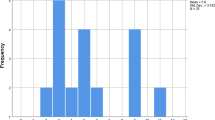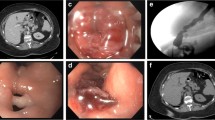Abstract
Background
Laparoscopic sleeve gastrectomy (LSG) is one of the most commonly performed bariatric procedures for treatment of morbid obesity. Despite its popularity, it is not without risks, the most serious of which is the staple line leak. Staple line leaks are difficult to manage and require significant resources in the form of surgical, radiological and endoscopic interventions; long hospital and intensive care stay and significant morbidity. International experience is slowly emerging, but there are still no clear guidelines regarding optimal management of leaks. This study aims to describe the experience of endoscopic management of these leaks by the authors and the development of a customised stent for this condition.
Methods
Middlemore Hospital is the largest bariatric surgery centre in New Zealand. Since June 2007, a total of 21 patients have received endotherapy for post-LSG leak management. Treatment included the deployment of primary self-expanding metal stents (SEMS) across the leak site, combined with complementary endoscopic modalities. Persistent leaks were treated with follow-up stenting. This study aimed to evaluate the effectiveness of post-LSG staple line leak management at Middlemore Hospital.
Results
A total of 20/21 (95 %) patients now have resolved leaks following a mean of 75 days of treatment (median 47, range 9–187). The mean number of endoscopic procedures required was five. Inpatient stay and average duration till leak resolution has been notably reduced since the addition of customised stents. Clinically significant stent migration occurred in 19 % of primary stents.
Conclusion
The use of SEMS in conjunction with complementary endotherapy has shown to be both safe and effective in treating sleeve leaks; however, migration is the limiting factor for optimal management. Recent improvements in stent design, such as the one proposed in this paper, show promise in addressing this problem. Earlier use of SEMS seems to reduce the time till closure as well as the total hospital stay, as is apparent from our data.




Similar content being viewed by others
References
World Health Organization. Obesity and overweight factsheet [WHO website]. Jan 2015. http://www.who.int/mediacentre/factsheets/fs311/en/. Accessed 22 Feb 2015.
New Zealand Ministry of Health. Obesity data and stats [NZ Ministry of Health website]. 2015. http://www.health.govt.nz/nz-health-statistics/health-statistics-and-data-sets/obesity-data-and-stats. Accessed 22 Feb 2015
Brethauer SA. Sleeve gastrectomy. Surg Clin North Am. 2011;91:1265–79.
Buchwald H, Oien DM. Metabolic/bariatric surgery worldwide 2011. Obes Surg. 2013;23(4):427–36.
Sarkhosh K, Birch DW, Sharma A, et al. Complications associated with laparoscopic sleeve gastrectomy for morbid obesity: a surgeon’s guide. Can J Surg. 2013;56(5):347–52.
Aurora AR, Khaitan L, Saber AA. Sleeve gastrectomy and the risk of leak: a systematic analysis of 4,888 patients. Surg Endosc. 2012;26(6):1509–15.
Benedix F, Benedix DD, Knoll C, et al. Are there risk factors that increase the rate of staple line leakage in patients undergoing primary sleeve gastrectomy for morbid obesity? Obes Surg. 2014;24(10):1610–6.
Eisendrath P, Cremer M, et al. Endotherapy including temporary stenting of fistulas of the upper gastrointestinal tract after laparoscopic bariatric surgery. Endoscopy. 2007;39:625–30.
Eubanks S, Edwards CA, Fearing NM, et al. Use of endoscopic stents to treat anastomotic complications after bariatric surgery. J Am Coll Surg. 2008;206:935–9.
Casella G, Soricelli E, Rizzello M, et al. Non surgical treatment of staple line leaks after laparoscopic sleeve gastrectomy. Obes Surg. 2009;19:821–6.
Nguyen NT, Nguyen XMT, Dholakia C. The use of endoscopic stent in management of leaks after sleeve gastrectomy. Obes Surg. 2010;20(9):1289–92.
Tan JT, Kariyawasam S, Wijeratne T, et al. Diagnosis and management of gastric leaks after laparoscopic sleeve gastrectomy for morbid obesity. Obes Surg. 2010;20(4):403–9.
Abou Rached A, Basile M, El Masri H. Gastric leaks post sleeve gastrectomy: review of its prevention and management. World J Gastroenterol. 2014;20(38):13904–10.
Rosenthal RJ, International Sleeve Gastrectomy Expert Panel, Diaz AA, et al. International Sleeve Gastrectomy Expert Panel Consensus Statement best practice guidelines based on experience of 12,000 cases. Surg Obes Relat Dis. 2012;8(1):8–19.
Burgos AM, Braghetto I, Csendes A, et al. Gastric leak after laparoscopic-sleeve gastrectomy for obesity. Obes Surg. 2009;19(12):1672–7.
de Aretxabala X, Leon J, Wiedmaier G, et al. Gastric leak after sleeve gastrectomy: analysis of its management. Obes Surg. 2011;21(8):1232–7.
Corona M, Zini C, Allegritti M, et al. Minimally invasive treatment of gastric leak after sleeve gastrectomy. Radiol Med. 2013;118(6):962–70.
Donatelli G, Ferretti S, Vergeau BM, et al. Endoscopic Internal Drainage with Enteral Nutrition (EDEN) for treatment of leaks following sleeve gastrectomy. Obes Surg. 2014;24(8):1400–7.
Alazmi W, Al-Sabah S, Ali DA, et al. Treating sleeve gastrectomy leak with endoscopic stenting: the Kuwaiti experience and review of recent literature. Surg Endosc. 2014;28(12):3425–8.
Galloro G, Magno L, Musella M, et al. A novel dedicated endoscopic stent for staple-line leaks after laparoscopic sleeve gastrectomy: a case series. Surg Obes Relat Dis. 2014;10(4):607–11.
Fischer A, Bausch D, Richter-Schrag HJ. Use of a specially designed partially covered self-expandable metal stent (PSEMS) with a 40-mm diameter for the treatment of upper gastrointestinal suture or staple line leaks in 11 cases. Surg Endosc. 2013;27(2):642–7.
Márquez MF, Ayza MF, Lozano RB, et al. Gastric leak after laparoscopic sleeve gastrectomy. Obes Surg. 2010;20(9):1306–11.
Basha J, Appasani S, Sinha SK, et al. Mega stents: a new option for management of leaks following laparoscopic sleeve gastrectomy. Endoscopy. 2014;46(Suppl 1 UCTN):E49–50.
Pequignot A, Fuks D, Verhaeghe P, et al. Is there a place for pigtail drains in the management of gastric leaks after laparoscopic sleeve gastrectomy? Obes Surg. 2012;22(5):712–20.
Slim R, Smayra T, Chakhtoura G, et al. Endoscopic stenting of gastric staple line leak following sleeve gastrectomy. Obes Surg. 2013;23(11):1942–5.
Donatelli G, Ferretti S, Vergeau BM, et al. Endoscopic Internal Drainage with Enteral Nutrition (EDEN) for treatment of leaks following sleeve gastrectomy. Obes Surg. 2014;24(8):1400–7.
Nedelcu M, Manos T, Cotirlet A, et al. Outcome of leaks after sleeve gastrectomy based on a new algorithm addressing leak size and gastric stenosis. Obes Surg. 2015.
Author information
Authors and Affiliations
Corresponding author
Ethics declarations
The study was approved by the Institutional research ethics committee and has been performed in accordance with the ethical standards as laid down in the 1964 Declaration of Helsinki and its later amendments or comparable ethical standards.
Conflict of Interest
Dr. Ravinder Ogra declares an Honorarium received for an ANZ medical advisory meeting for Boston Scientific Corporation Australia in 2013. Dr. Tien Huey Lim and Thomas Southwell do not have any conflict of interest or declaration.
Informed Consent
Informed consent was obtained from all individual participants included in this study.
Rights and permissions
About this article
Cite this article
Southwell, T., Lim, T.H. & Ogra, R. Endoscopic Therapy for Treatment of Staple Line Leaks Post-Laparoscopic Sleeve Gastrectomy (LSG): Experience from a Large Bariatric Surgery Centre in New Zealand. OBES SURG 26, 1155–1162 (2016). https://doi.org/10.1007/s11695-015-1931-0
Published:
Issue Date:
DOI: https://doi.org/10.1007/s11695-015-1931-0




